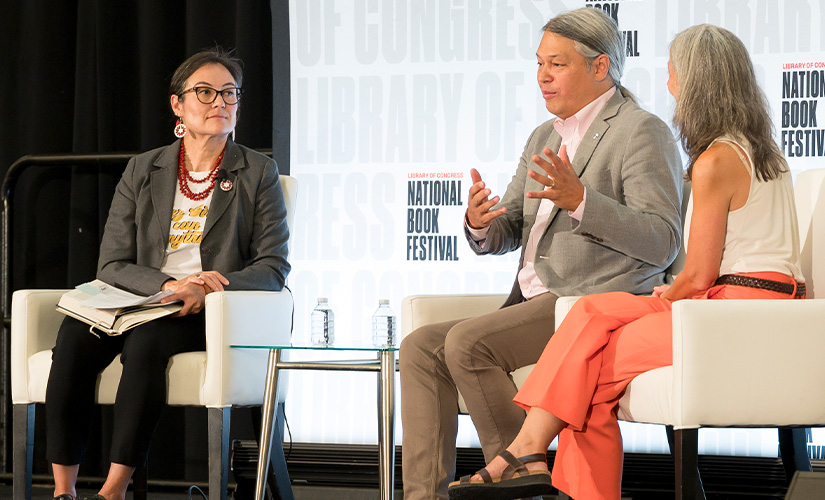-and-
Author and academic Ned Blackhawk has been studying Native American history for a long time, and he thinks there are reasons to be optimistic about the future.
Source: Library of Congress
Ned Blackhawk says that groundwork laid over the past several decades, particularly in the 1970s protest movements, has established a growing recognition of Native American influence on the foundations of U.S. culture and society.

“We’re kind of living through this literary and cultural — and one might even say media — renaissance,” he said in a presentation called “American History Is Native History” at the Library’s 2024 National Book Festival. “It’s paralleling or connected to the larger political and economic and social revolution that has been occurring across Indian Country for the past two generations.”
Buy This Book on Amazon

Las Cruces Digest may make commission off any purchases made following this link.
Blackhawk, a member of the Western Shoshone nation, is the Howard R. Lamar professor of history at Yale University and a well-known scholar in the field. His latest book, “The Rediscovery of America,” won the National Book Award for nonfiction this year. At the NBF, he was in conversation with fellow historian Kathleen DuVal, whose “Native Nations: A Millennium in North was published in April. The conversation was moderated by Shelly C. Lowe (Navajo), chair of the National Endowment for the Humanities.
That growth in representation has been taking place across American society, from politics to scholarship to grassroots government on tribal reservations.
In politics, Deb Haaland (Laguna Pueblo) became the first Native American to serve as the U.S. Secretary of the Interior in 2021, after rising to political prominence in her native New Mexico. In academics, the Native American Indigenous Studies Association has become one of the “growth fields” in academia over the past two decades, Blackhawk said, and is connecting with other indigenous studies associations across the globe.
Culturally, there are several examples. Joy Harjo of the Muscogee (Creek) nation became the first Native American to serve as the U.S. poet laureate when Librarian of Congress Carla Hayden named her to the position in 2019; she served for three years. Tommy Orange (Cheyenne/Arapaho) was a finalist for the Pulitzer Prize for fiction in 2019 for his novel “There There.” Filmmaker Sterlin Harjo (Seminole, Oklahoma) took “Reservation Dogs,” a comedy set on an Oklahoma reservation, for a three-year run on FX, concluding last year. He is a 2024 MacArthur fellow (commonly called the “genius” grant). Actress Lily Gladstone, raised on the Blackfeet Reservation in Montana, has gained critical acclaim in several roles, including earning a 2024 Oscar nomination for best actress for “Killers of the Flower Moon.”
-and-
Meanwhile, tribal governments have gained more autonomy over the past decades, perhaps most notably in the gaming industry. These and other gains are a hard-won act of survival and determination, Blackhawk said, despite centuries of attempts by white settlers to erase them from the map.
“Native nations have had decades — in some cases, centuries — of powerful people and institutions trying to make them not exist,” he said. But, he notes, “There are still tribes all across the United States, often within a 50-mile radius of most large urban centers, who maintain governments, who have citizens, who have delegated budgets and economies, who run hospitals or health care initiatives for their families.”
But the progress isn’t easy or neat. For more than two centuries, Blackhawk and DuVal both said, American history has been taught from only the settlers’ point of view, often dismissing Native viewpoints entirely, leaving behind a misleading account of how the nation was cobbled together.
The result, they said, is that their students are often ignorant of the most basic history of Native American societies that shaped America’s formation. Contact, negotiations and wars went on for more than 200 years between white settlers and Native nations, from the East Coast to the West, in disputes involving hundreds of tribes and across geography ranging from the wooded Northeast to the desert-dry Southwest.
For example, Blackhawk writes, history tends to cast the Colonial struggle with Britain over taxes, exemplified by the Boston Tea Party. But much of the conflict settlers had with the British government was on the western frontier, where settlers wanted to push forward into French and Native territories. Further, in the early days of the nation, most of the first international law the young nation had to deal with was with Native nations in treaties, setting precedents that applied for decades.
“For so long, and really on purpose, the story of American history was told from one perspective,” DuVal said. “And now I think in our classrooms and our books, we’re trying to tell it from multiple perspectives.”





